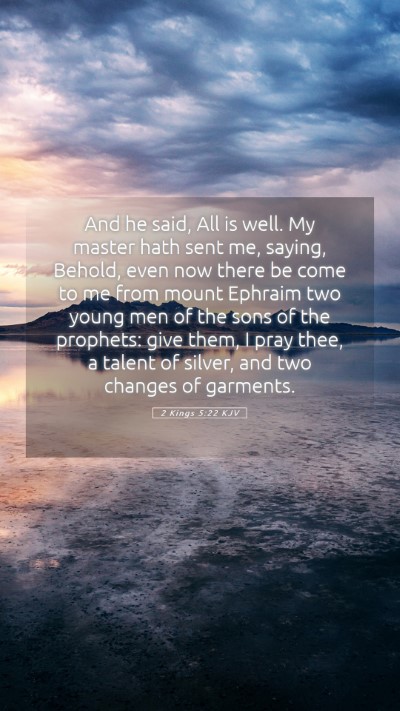Understanding 2 Kings 5:22: A Comprehensive Bible Verse Commentary
2 Kings 5:22 reads as follows: "And he said, All is well. My master hath sent me, saying, Behold, even now there be come to me from mount Ephraim two young men of the sons of the prophets: give them, I pray thee, a talent of silver, and two changes of garments."
Contextual Overview
This verse falls within the narrative of Naaman's healing from leprosy and the subsequent actions of Gehazi, Elisha's servant. Naaman, a commander from Syria, sought healing from Elisha, and after being cured, offered gifts to Elisha which were initially refused. Gehazi, motivated by greed, lies to Naaman in order to obtain gifts.
Verse Interpretation and Commentary
The actions of Gehazi in this verse can be viewed through several theological lenses, offering deep insights into the nature of deceit, greed, and the consequences of such actions.
- Matthew Henry's Commentary:
Henry posits that Gehazi's deceit reveals a lack of faith in God's provision. Instead of relying on God’s blessings, he chose to act in his own interests, betraying his master for material gain. This act of greed can serve as a cautionary tale about the spiritual dangers associated with wealth and dishonesty.
- Albert Barnes' Notes:
Barnes elaborates on the nature of Gehazi's deceit. By fabricating a story concerning the sons of the prophets, Gehazi not only misleads Naaman but also devalues the spiritual calling he is a part of. This act signifies a deeper moral and ethical decline, emphasizing the importance of integrity in service to the Lord.
- Adam Clarke’s Commentary:
Clarke emphasizes the severe implications of Gehazi's actions. He points out that Gehazi’s lust for wealth ultimately led to his corruption. Clarke interprets this passage as a broader warning against temptation and the incessant human struggle with covetousness, aligning with the teaching that one cannot serve both God and riches.
Key Themes in 2 Kings 5:22
- Deceit and Dishonesty:
This verse showcases the theme of deception, as Gehazi lies to Naaman, which reflects the pitfalls of prioritizing personal gain over honesty and integrity.
- Greed and Materialism:
Gehazi's actions underscore the dangers of greed, demonstrating that the pursuit of rich rewards can lead one astray from their spiritual journey.
- The Consequences of Sin:
The narrative warns of the inevitable consequences that arise from sin, which Gehazi would face later in the story, reinforcing the notion that actions driven by selfish motives cannot go unpunished.
- Divine Provision:
Overall, the passage conveys a stark reminder of God’s ability to provide for His people without the need for unethical practices.
Application of the Verse
This scripture invites readers to reflect upon their own actions and motivations. In modern application, believers are encouraged to:
- Practice honesty in all dealings, recognizing that deceit serves only to undermine one's spiritual integrity.
- Trust in God's provision instead of succumbing to the temptations of greed or materialism.
- Maintain a focus on spiritual wealth rather than earthly treasures, understanding that true fulfillment comes from a life guided by God's principles.
Related Cross References
- 2 Kings 4:42-44: Concerning God's miraculous provision, showcasing His power to provide abundantly.
- Proverbs 20:17: “Bread gotten by deceit is sweet to a man; but afterwards his mouth shall be filled with gravel,” reflecting the fleeting nature of ill-gotten gains.
- Luke 16:13: “No servant can serve two masters,” highlighting the incompatibility of serving God while being ensnared by material wealth.
- 1 Timothy 6:10: “For the love of money is the root of all evil,” which correlates directly with the motivations behind Gehazi's actions.
Concluding Thoughts
The account of Gehazi in 2 Kings 5:22 serves not only as an intriguing narrative within Scripture but also offers rich insights into the complexities of human nature when confronted with greed, dishonesty, and moral failure.
As one engages in bible study insights and biblical exegesis, this story provides a profound opportunity for reflection on personal integrity and reliance on God's goodness. Whether in bible study groups or through online bible study platforms, the lessons drawn from this passage encourage believers to seek a deeper understanding of the meaning of Bible verses and their applications to daily life.


